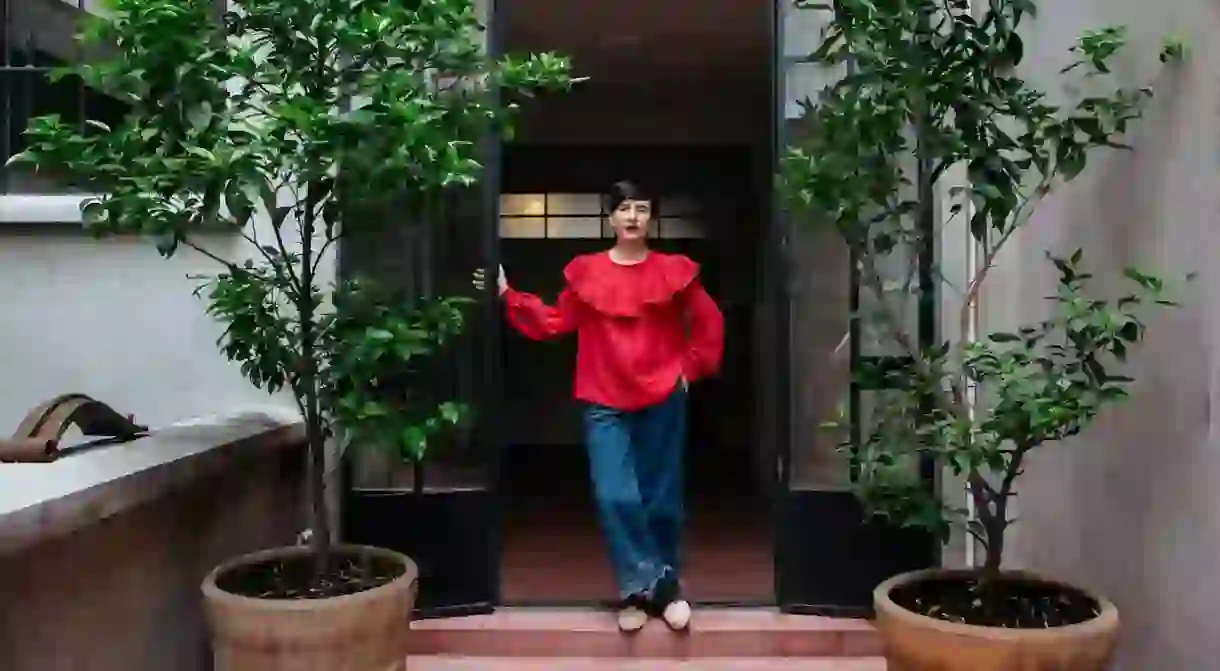Carla Fernández Wants to End the Trend of Disposable Clothing

In Mexico City, designer Carla Fernández approaches clothing as a way to wear culture. By breathing life into the textiles of her garments, the designer awakens historical memory and makes clothing indisposable, a welcome antidote to today’s trend of fast fashion.

“Clothing is the first language you speak when you see someone,” says designer Carla Fernández. By getting dressed, she says, “you wear political expression. [Clothes] represent who you are.”

To that end, who you are also speaks to where you come from. Fernández incorporates this tenet into her designs by collaborating with artisans from 12 different Mexican territories. “Every community has its expertise. We see what [different artisan communities] do well and we work with them on techniques that are related to their tradition.”

For example, counted-stitch and raised embroidery is native to San Pedro Chenalhó and Chiapas, while cross-stitch embroidery is native to Hueyapan and Puebla, and hand knitting native to Mexico City. Artisans from these various regions execute crafting techniques that build upon their cultural heritage. “This is how fashion started,” says Fernández. “We’re going back to the origin.”

Heritage strikes a personal as well as political chord with Fernández. “My mother is a fashionista,” she says. “[Because of her] I was interested in fashion at an early age. My mother used to mix and match the latest trends with folk art [style of clothes.] She’d wear tiny hot pants and gogo boots with a traditional folk art blouse.”

And so, Fernández developed a personal style that fuses indigenous dressing with of the moment items. This is also the mantra of her label, which strives for a forward-looking aesthetic comprising traditional elements. “When I was 12, I’d wear a hairy poncho with shiny metallic skirts, and my teachers would get upset.” Understanding fashion could affect people’s emotions was a pivotal moment for Fernandez. “People thought I was weird [because of how I dressed.] They thought it was too much. But I learned how to fight for my right to dress up.”

Twelve years ago, Fernandez realized her vision to dress up, and launched the label. Each collection is labor intensive meaningher work falls into the slow fashion oeuvre of dressing, which prioritizes quality over quantity. “Prêt-à-porter changed fashion,” says Fernández disapprovingly.“I’m changing it back.”

Fernández begins by hammering out the concept on a mood board with the label’s head of design Erin Lewis. “We propose our own terms for the fashion we want to produce.” Outside of indigenous artisans, Fernández is a fan of the work of Galliano and Margiela, whose deconstructed aesthetic is an obvious influence.

Fernández defines her aesthetic – bold color blocking, hearty textiles, and a focus on traditional geometric shapes – as “surrealist, moving to genderless expression.” In this regard, the label is in step with gender fluid dressing that’s all the rage at the moment. However, trends don’t interest the designer. “We are aware of trends, but even more important is the [collection’s] concept and research that goes into it.” The most encompassing leaning right now, she argues, is towards the ethos of sustainability. “We can not keep telling the politicians that they have to solve [the problem of fast-fashion.] We have to change it ourselves.”

Today, her label helps change the lives of many people in the Mexican states. For the designer, the ability to impact the lives of indigenous communities is only part of what drives her creative vision. “You get dressed,” she says with a full-bodied laugh. “Or else you get depressed.” And in this way, the house of Carla Fernández clothes people in fashion that is not frivolous.













